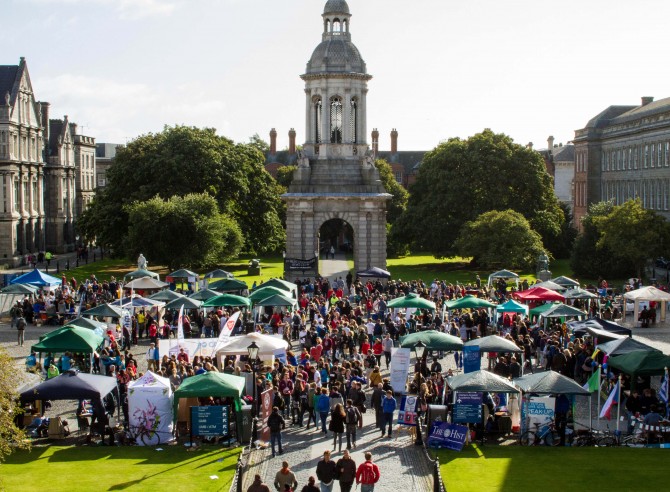42% of Trinity’s society heads are women, according to an investigation conducted by Trinity News. In comparison, only 30.2% of the 96 TCDSU sabbatical officer candidates who have run in the TCDSU sabbatical officer elections since 2011/12 have been women.
Women head slightly more science-related societies than arts-related. In science-related societies, women accounted for 46% of the chairs, while 42% arts-related societies were led by women.
Of the societies that don’t relate strictly to either science or arts, such as Horseracing Society or Trinity Yoga Society, 40% were headed by women. No society heads surveyed identified themselves as non-binary.
Speaking to Trinity News, Trinity College Dublin Students’ Union (TCDSU) Education Officer Alice MacPherson explained that “when running in a society election, you will most likely know the voters personally. To run for a sabbatical position in TCDSU, a woman has to stand up in front of the entire student body to be judged. Female students are used to being judged more harshly than their male peers in every aspect of their life, inside and outside of College”.
“Moreover, an election with thousands of voters is far more daunting than an average society or sports club AGM. In wider society, this is reflected, where we see greater involvement of women in politics in the local level than on the national level,” MacPherson continued.
TCDSU Gender Equality Officer Áine Palmer expressed a similar sentiment that the large-scale nature of TCDSU elections are a more significant barrier to women in comparison to society elections. Speaking to Trinity News, Palmer said: “From my own experience of chairing with Dublin University Gender Equality Society (DUGES) last year, I know taking on that leadership role didn’t feel very daunting both because it was within a community of my peers who I knew well through engagement with the society”.
“Leadership skills are transferable, and any of the many women who have acted as leaders within clubs and societies would make a great (TCDSU) President. But the many ways in which women and minorities are dissuaded from taking on leadership roles – so socialisation, a fear of media scrutiny, etc – are magnified when they’re on such a large scale,” explained Palmer.
“Unfortunately this year’s incredibly disappointing lack of diversity [in TCDSU] just shows that we need to try and encourage women more to push past these fears and run for positions. They’re certainly as capable, if not more, than the men who are giving it a shot this year.”
Additionally, arts students outnumber science students in the highest position of societies.
Science students, including the Health Sciences, comprise 42% of society heads, while Arts students account for a further 57%. One society leader is currently undertaking the Trinity Access Programme (TAP).
There is a very strong trend of arts-related societies being led by arts students and science-related societies being led by science students. Of all societies relating to science which were surveyed, none are led by an arts student.
Speaking to Trinity News, MacPherson explained that “societies cater to specific cohorts with specific interests. People are far more likely to invest their extra-curricular time in something that has a direct correlation to their existing interests, earlier on in their College career”.
“Students in STEM and Health Sciences typically have higher course hours and can be more discerning with their time,” she added.






